Analysis of Economic and Political Impacts on Travel & Tourism Sector
VerifiedAdded on 2023/03/29
|11
|2732
|332
Report
AI Summary
This report provides a detailed analysis of the travel and tourism sector, focusing on key historical developments, the structure of the industry, and the influences of government policies and political changes. It examines factors affecting tourism demand, how supply adapts to meet these demands, and the economic, environmental, and social impacts of tourism. The report also outlines strategies to minimize negative impacts and maximize positive ones, using the TUI Group as a case study. The analysis covers the importance of political stability, economic factors like currency value, and technological advancements, emphasizing the need for tour operators to consider these elements in their strategies. Ultimately, the report concludes that the travel and tourism sector is a fast-growing industry with significant potential for economic development and employment generation.
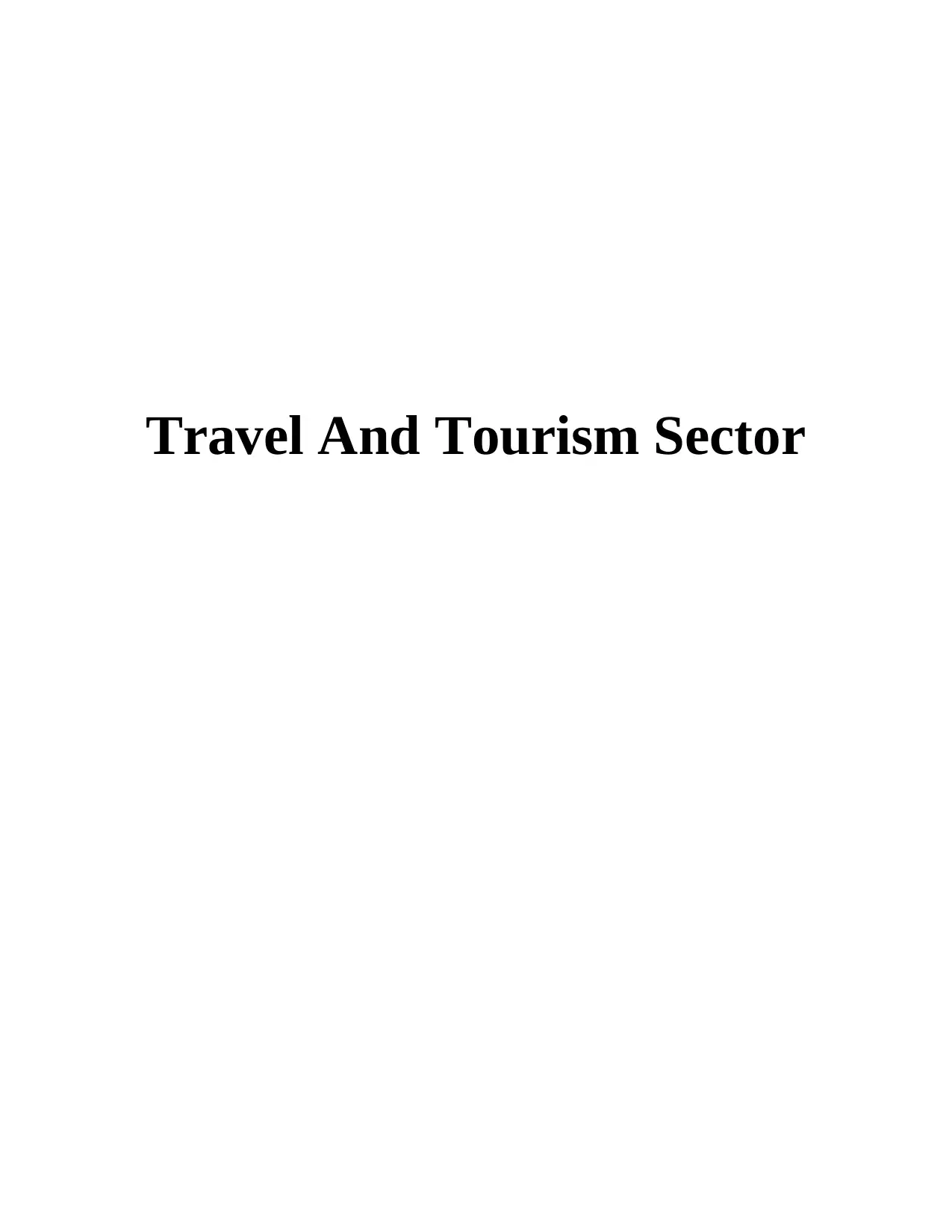
Travel And Tourism Sector
Paraphrase This Document
Need a fresh take? Get an instant paraphrase of this document with our AI Paraphraser
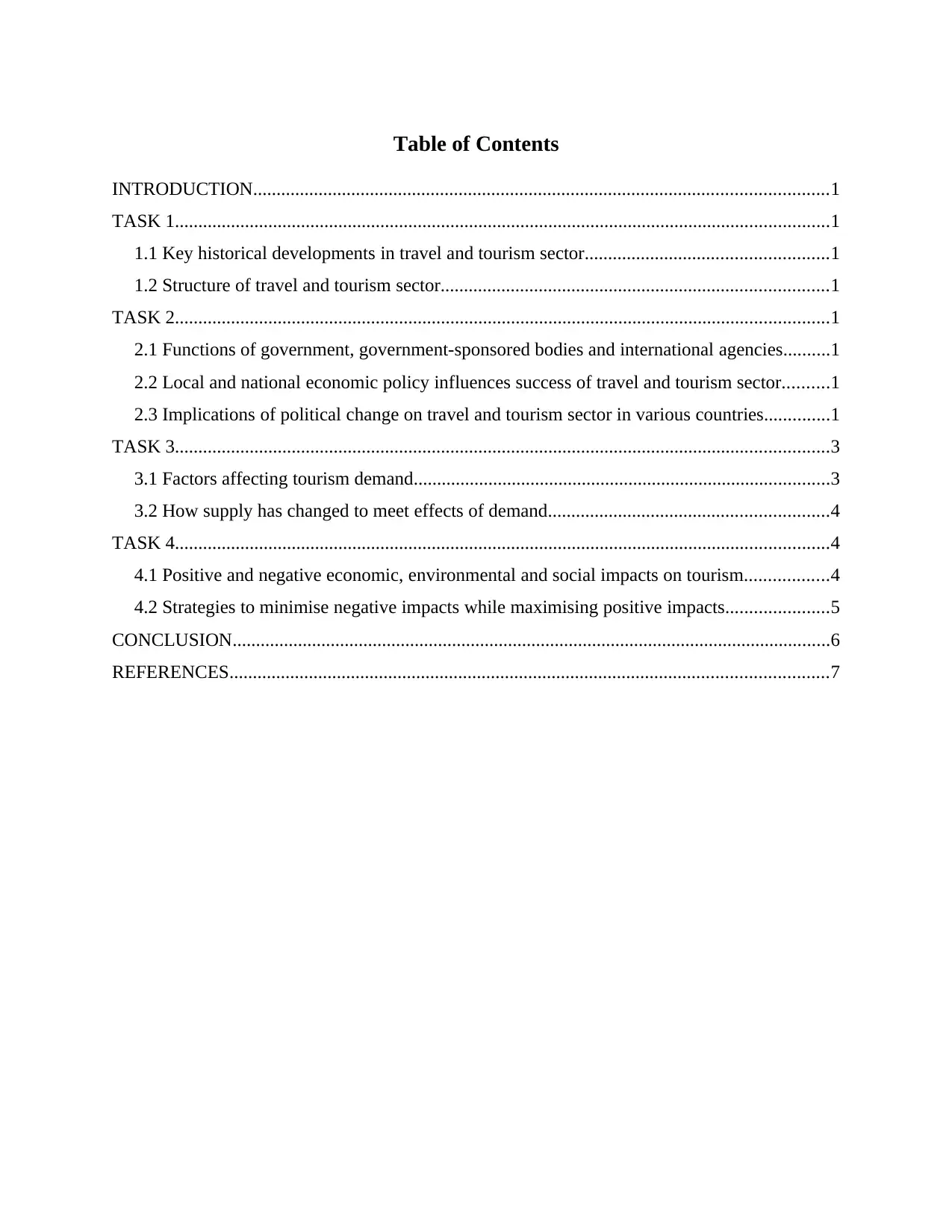
Table of Contents
INTRODUCTION...........................................................................................................................1
TASK 1............................................................................................................................................1
1.1 Key historical developments in travel and tourism sector....................................................1
1.2 Structure of travel and tourism sector...................................................................................1
TASK 2............................................................................................................................................1
2.1 Functions of government, government-sponsored bodies and international agencies..........1
2.2 Local and national economic policy influences success of travel and tourism sector..........1
2.3 Implications of political change on travel and tourism sector in various countries..............1
TASK 3............................................................................................................................................3
3.1 Factors affecting tourism demand.........................................................................................3
3.2 How supply has changed to meet effects of demand............................................................4
TASK 4............................................................................................................................................4
4.1 Positive and negative economic, environmental and social impacts on tourism..................4
4.2 Strategies to minimise negative impacts while maximising positive impacts......................5
CONCLUSION................................................................................................................................6
REFERENCES................................................................................................................................7
INTRODUCTION...........................................................................................................................1
TASK 1............................................................................................................................................1
1.1 Key historical developments in travel and tourism sector....................................................1
1.2 Structure of travel and tourism sector...................................................................................1
TASK 2............................................................................................................................................1
2.1 Functions of government, government-sponsored bodies and international agencies..........1
2.2 Local and national economic policy influences success of travel and tourism sector..........1
2.3 Implications of political change on travel and tourism sector in various countries..............1
TASK 3............................................................................................................................................3
3.1 Factors affecting tourism demand.........................................................................................3
3.2 How supply has changed to meet effects of demand............................................................4
TASK 4............................................................................................................................................4
4.1 Positive and negative economic, environmental and social impacts on tourism..................4
4.2 Strategies to minimise negative impacts while maximising positive impacts......................5
CONCLUSION................................................................................................................................6
REFERENCES................................................................................................................................7
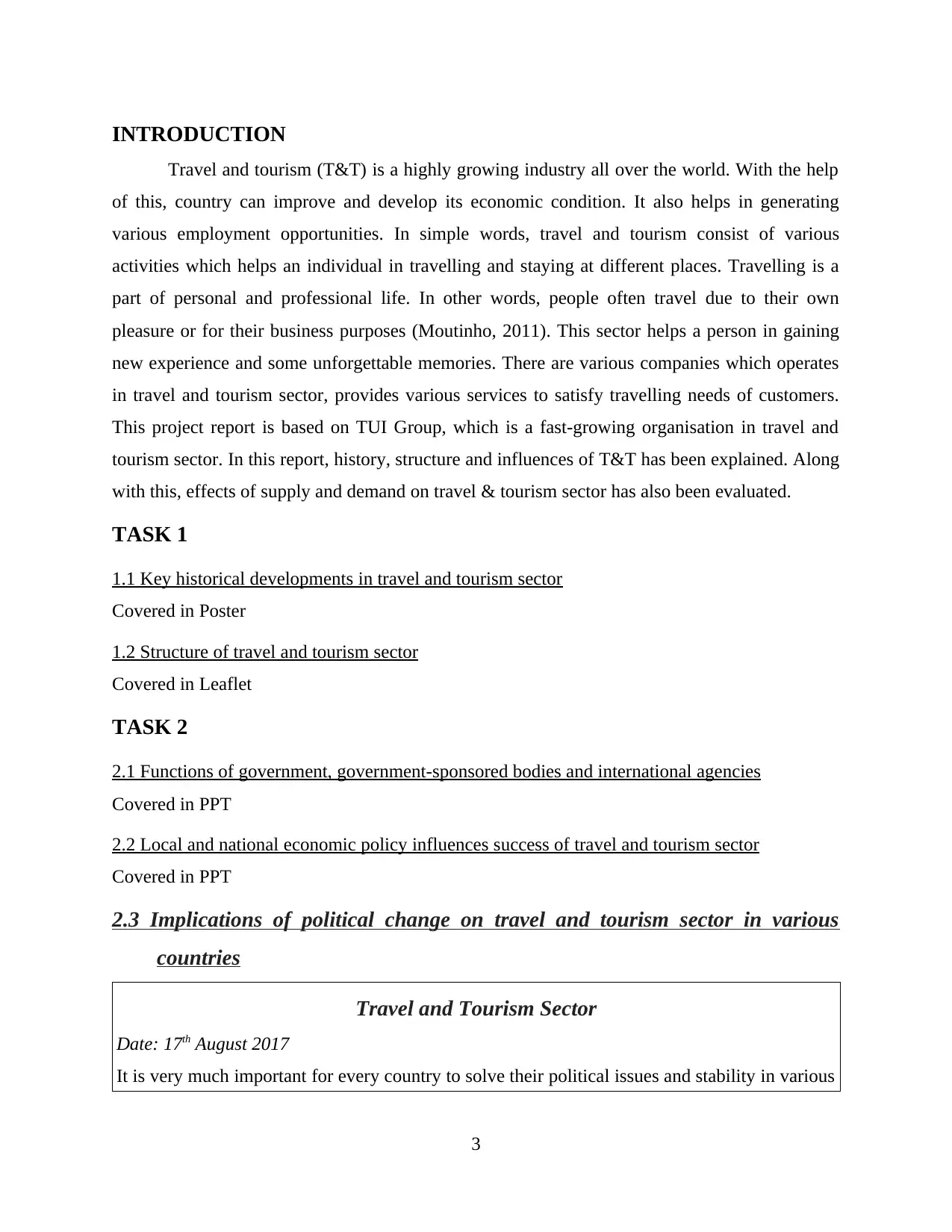
INTRODUCTION
Travel and tourism (T&T) is a highly growing industry all over the world. With the help
of this, country can improve and develop its economic condition. It also helps in generating
various employment opportunities. In simple words, travel and tourism consist of various
activities which helps an individual in travelling and staying at different places. Travelling is a
part of personal and professional life. In other words, people often travel due to their own
pleasure or for their business purposes (Moutinho, 2011). This sector helps a person in gaining
new experience and some unforgettable memories. There are various companies which operates
in travel and tourism sector, provides various services to satisfy travelling needs of customers.
This project report is based on TUI Group, which is a fast-growing organisation in travel and
tourism sector. In this report, history, structure and influences of T&T has been explained. Along
with this, effects of supply and demand on travel & tourism sector has also been evaluated.
TASK 1
1.1 Key historical developments in travel and tourism sector
Covered in Poster
1.2 Structure of travel and tourism sector
Covered in Leaflet
TASK 2
2.1 Functions of government, government-sponsored bodies and international agencies
Covered in PPT
2.2 Local and national economic policy influences success of travel and tourism sector
Covered in PPT
2.3 Implications of political change on travel and tourism sector in various
countries
Travel and Tourism Sector
Date: 17th August 2017
It is very much important for every country to solve their political issues and stability in various
3
Travel and tourism (T&T) is a highly growing industry all over the world. With the help
of this, country can improve and develop its economic condition. It also helps in generating
various employment opportunities. In simple words, travel and tourism consist of various
activities which helps an individual in travelling and staying at different places. Travelling is a
part of personal and professional life. In other words, people often travel due to their own
pleasure or for their business purposes (Moutinho, 2011). This sector helps a person in gaining
new experience and some unforgettable memories. There are various companies which operates
in travel and tourism sector, provides various services to satisfy travelling needs of customers.
This project report is based on TUI Group, which is a fast-growing organisation in travel and
tourism sector. In this report, history, structure and influences of T&T has been explained. Along
with this, effects of supply and demand on travel & tourism sector has also been evaluated.
TASK 1
1.1 Key historical developments in travel and tourism sector
Covered in Poster
1.2 Structure of travel and tourism sector
Covered in Leaflet
TASK 2
2.1 Functions of government, government-sponsored bodies and international agencies
Covered in PPT
2.2 Local and national economic policy influences success of travel and tourism sector
Covered in PPT
2.3 Implications of political change on travel and tourism sector in various
countries
Travel and Tourism Sector
Date: 17th August 2017
It is very much important for every country to solve their political issues and stability in various
3
⊘ This is a preview!⊘
Do you want full access?
Subscribe today to unlock all pages.

Trusted by 1+ million students worldwide
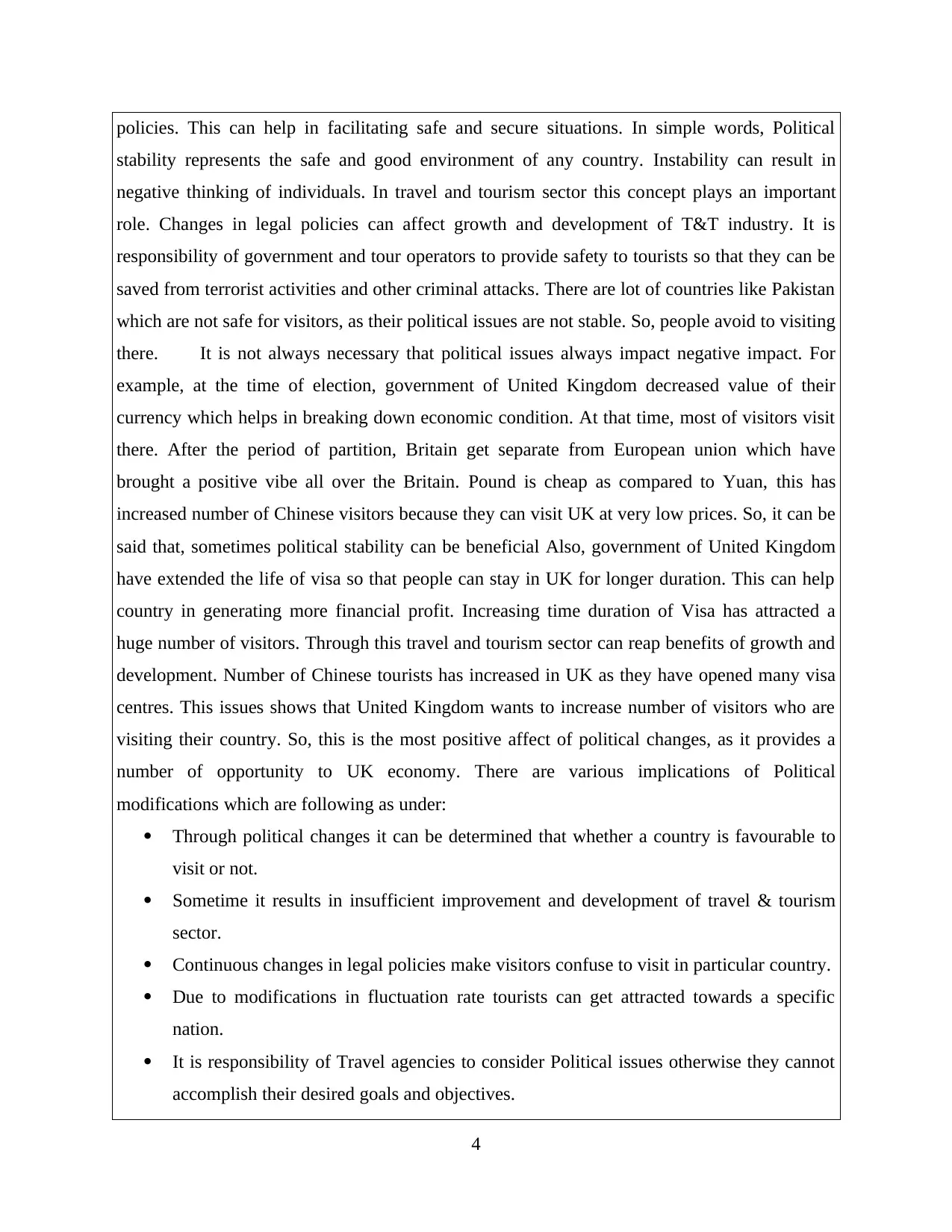
policies. This can help in facilitating safe and secure situations. In simple words, Political
stability represents the safe and good environment of any country. Instability can result in
negative thinking of individuals. In travel and tourism sector this concept plays an important
role. Changes in legal policies can affect growth and development of T&T industry. It is
responsibility of government and tour operators to provide safety to tourists so that they can be
saved from terrorist activities and other criminal attacks. There are lot of countries like Pakistan
which are not safe for visitors, as their political issues are not stable. So, people avoid to visiting
there. It is not always necessary that political issues always impact negative impact. For
example, at the time of election, government of United Kingdom decreased value of their
currency which helps in breaking down economic condition. At that time, most of visitors visit
there. After the period of partition, Britain get separate from European union which have
brought a positive vibe all over the Britain. Pound is cheap as compared to Yuan, this has
increased number of Chinese visitors because they can visit UK at very low prices. So, it can be
said that, sometimes political stability can be beneficial Also, government of United Kingdom
have extended the life of visa so that people can stay in UK for longer duration. This can help
country in generating more financial profit. Increasing time duration of Visa has attracted a
huge number of visitors. Through this travel and tourism sector can reap benefits of growth and
development. Number of Chinese tourists has increased in UK as they have opened many visa
centres. This issues shows that United Kingdom wants to increase number of visitors who are
visiting their country. So, this is the most positive affect of political changes, as it provides a
number of opportunity to UK economy. There are various implications of Political
modifications which are following as under:
Through political changes it can be determined that whether a country is favourable to
visit or not.
Sometime it results in insufficient improvement and development of travel & tourism
sector.
Continuous changes in legal policies make visitors confuse to visit in particular country.
Due to modifications in fluctuation rate tourists can get attracted towards a specific
nation.
It is responsibility of Travel agencies to consider Political issues otherwise they cannot
accomplish their desired goals and objectives.
4
stability represents the safe and good environment of any country. Instability can result in
negative thinking of individuals. In travel and tourism sector this concept plays an important
role. Changes in legal policies can affect growth and development of T&T industry. It is
responsibility of government and tour operators to provide safety to tourists so that they can be
saved from terrorist activities and other criminal attacks. There are lot of countries like Pakistan
which are not safe for visitors, as their political issues are not stable. So, people avoid to visiting
there. It is not always necessary that political issues always impact negative impact. For
example, at the time of election, government of United Kingdom decreased value of their
currency which helps in breaking down economic condition. At that time, most of visitors visit
there. After the period of partition, Britain get separate from European union which have
brought a positive vibe all over the Britain. Pound is cheap as compared to Yuan, this has
increased number of Chinese visitors because they can visit UK at very low prices. So, it can be
said that, sometimes political stability can be beneficial Also, government of United Kingdom
have extended the life of visa so that people can stay in UK for longer duration. This can help
country in generating more financial profit. Increasing time duration of Visa has attracted a
huge number of visitors. Through this travel and tourism sector can reap benefits of growth and
development. Number of Chinese tourists has increased in UK as they have opened many visa
centres. This issues shows that United Kingdom wants to increase number of visitors who are
visiting their country. So, this is the most positive affect of political changes, as it provides a
number of opportunity to UK economy. There are various implications of Political
modifications which are following as under:
Through political changes it can be determined that whether a country is favourable to
visit or not.
Sometime it results in insufficient improvement and development of travel & tourism
sector.
Continuous changes in legal policies make visitors confuse to visit in particular country.
Due to modifications in fluctuation rate tourists can get attracted towards a specific
nation.
It is responsibility of Travel agencies to consider Political issues otherwise they cannot
accomplish their desired goals and objectives.
4
Paraphrase This Document
Need a fresh take? Get an instant paraphrase of this document with our AI Paraphraser
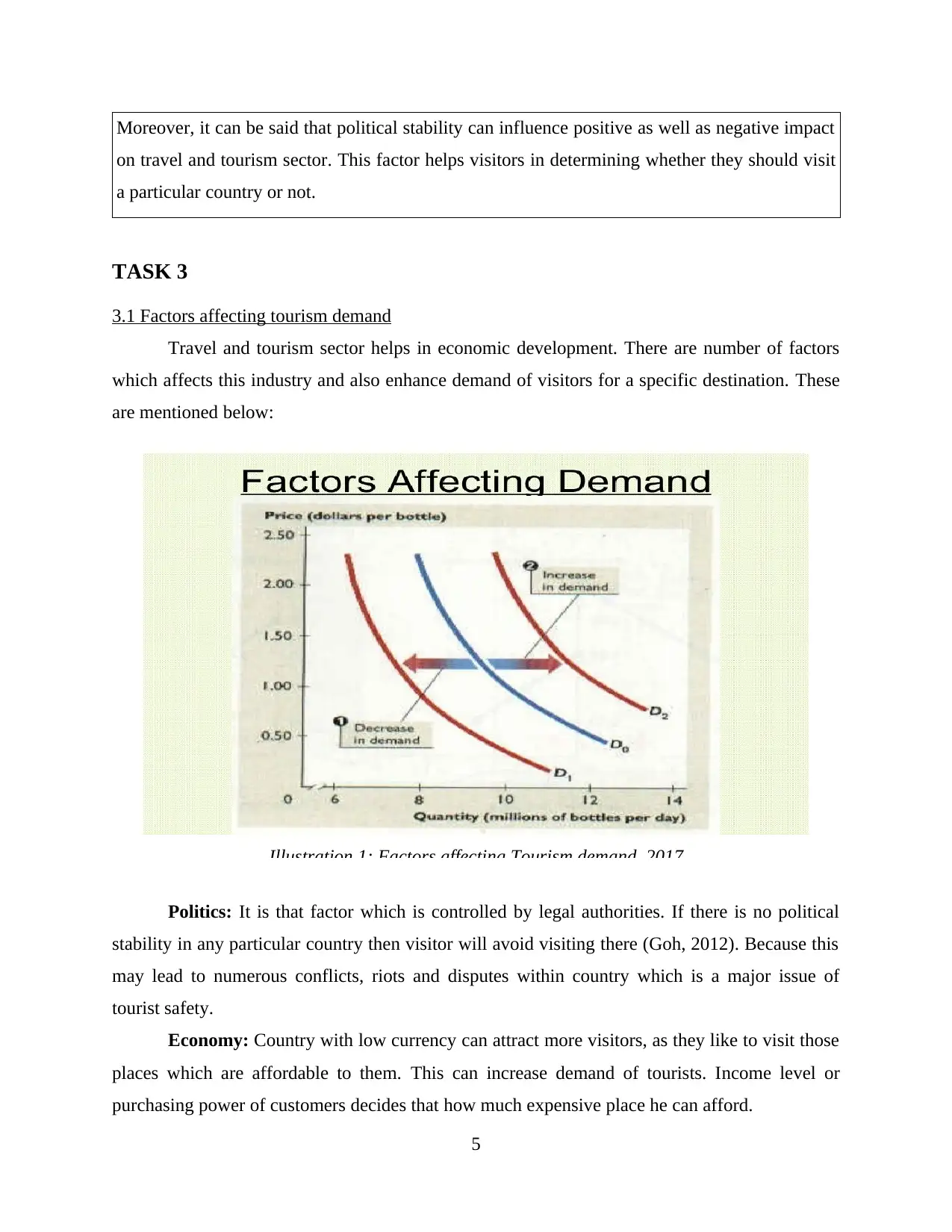
Moreover, it can be said that political stability can influence positive as well as negative impact
on travel and tourism sector. This factor helps visitors in determining whether they should visit
a particular country or not.
TASK 3
3.1 Factors affecting tourism demand
Travel and tourism sector helps in economic development. There are number of factors
which affects this industry and also enhance demand of visitors for a specific destination. These
are mentioned below:
Politics: It is that factor which is controlled by legal authorities. If there is no political
stability in any particular country then visitor will avoid visiting there (Goh, 2012). Because this
may lead to numerous conflicts, riots and disputes within country which is a major issue of
tourist safety.
Economy: Country with low currency can attract more visitors, as they like to visit those
places which are affordable to them. This can increase demand of tourists. Income level or
purchasing power of customers decides that how much expensive place he can afford.
5
Illustration 1: Factors affecting Tourism demand. 2017
on travel and tourism sector. This factor helps visitors in determining whether they should visit
a particular country or not.
TASK 3
3.1 Factors affecting tourism demand
Travel and tourism sector helps in economic development. There are number of factors
which affects this industry and also enhance demand of visitors for a specific destination. These
are mentioned below:
Politics: It is that factor which is controlled by legal authorities. If there is no political
stability in any particular country then visitor will avoid visiting there (Goh, 2012). Because this
may lead to numerous conflicts, riots and disputes within country which is a major issue of
tourist safety.
Economy: Country with low currency can attract more visitors, as they like to visit those
places which are affordable to them. This can increase demand of tourists. Income level or
purchasing power of customers decides that how much expensive place he can afford.
5
Illustration 1: Factors affecting Tourism demand. 2017
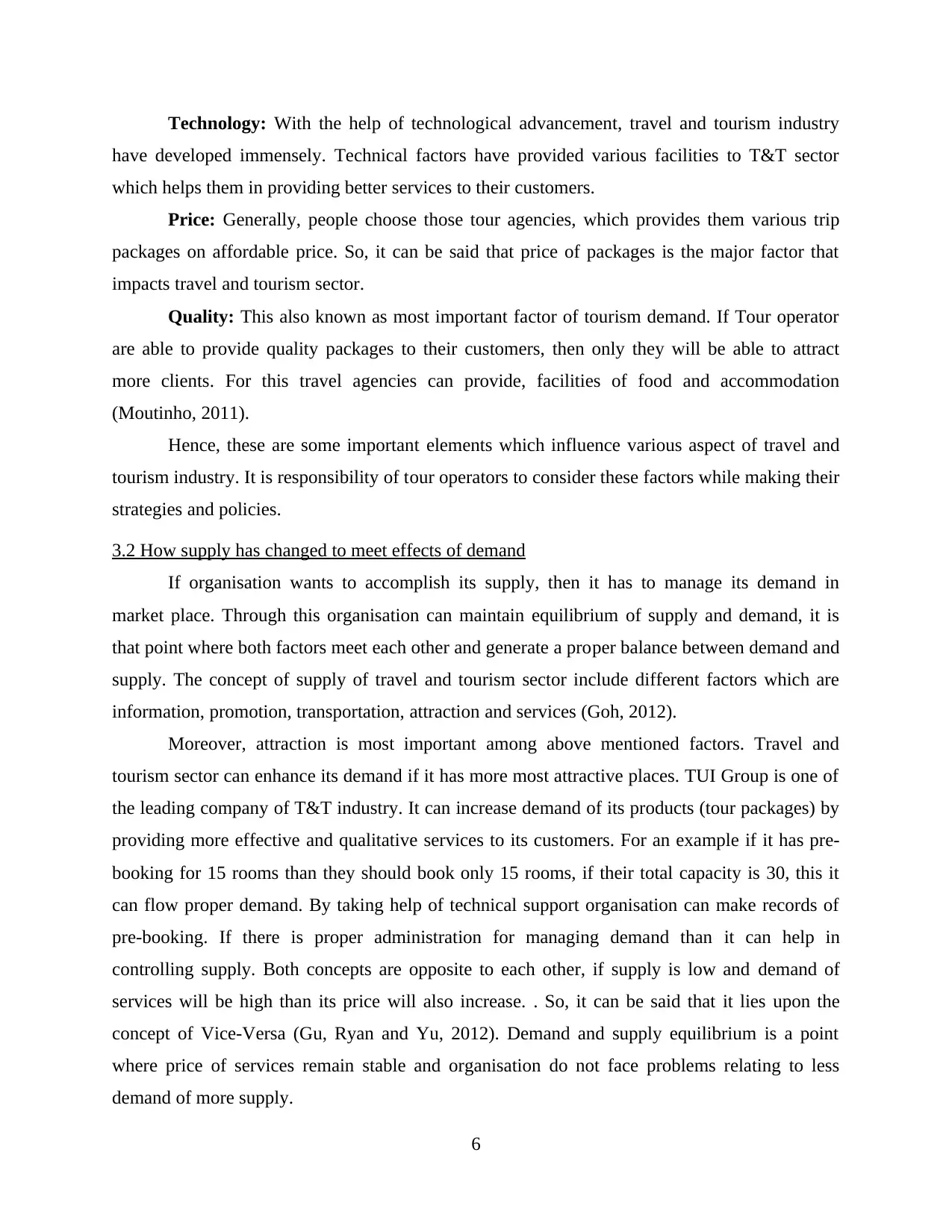
Technology: With the help of technological advancement, travel and tourism industry
have developed immensely. Technical factors have provided various facilities to T&T sector
which helps them in providing better services to their customers.
Price: Generally, people choose those tour agencies, which provides them various trip
packages on affordable price. So, it can be said that price of packages is the major factor that
impacts travel and tourism sector.
Quality: This also known as most important factor of tourism demand. If Tour operator
are able to provide quality packages to their customers, then only they will be able to attract
more clients. For this travel agencies can provide, facilities of food and accommodation
(Moutinho, 2011).
Hence, these are some important elements which influence various aspect of travel and
tourism industry. It is responsibility of tour operators to consider these factors while making their
strategies and policies.
3.2 How supply has changed to meet effects of demand
If organisation wants to accomplish its supply, then it has to manage its demand in
market place. Through this organisation can maintain equilibrium of supply and demand, it is
that point where both factors meet each other and generate a proper balance between demand and
supply. The concept of supply of travel and tourism sector include different factors which are
information, promotion, transportation, attraction and services (Goh, 2012).
Moreover, attraction is most important among above mentioned factors. Travel and
tourism sector can enhance its demand if it has more most attractive places. TUI Group is one of
the leading company of T&T industry. It can increase demand of its products (tour packages) by
providing more effective and qualitative services to its customers. For an example if it has pre-
booking for 15 rooms than they should book only 15 rooms, if their total capacity is 30, this it
can flow proper demand. By taking help of technical support organisation can make records of
pre-booking. If there is proper administration for managing demand than it can help in
controlling supply. Both concepts are opposite to each other, if supply is low and demand of
services will be high than its price will also increase. . So, it can be said that it lies upon the
concept of Vice-Versa (Gu, Ryan and Yu, 2012). Demand and supply equilibrium is a point
where price of services remain stable and organisation do not face problems relating to less
demand of more supply.
6
have developed immensely. Technical factors have provided various facilities to T&T sector
which helps them in providing better services to their customers.
Price: Generally, people choose those tour agencies, which provides them various trip
packages on affordable price. So, it can be said that price of packages is the major factor that
impacts travel and tourism sector.
Quality: This also known as most important factor of tourism demand. If Tour operator
are able to provide quality packages to their customers, then only they will be able to attract
more clients. For this travel agencies can provide, facilities of food and accommodation
(Moutinho, 2011).
Hence, these are some important elements which influence various aspect of travel and
tourism industry. It is responsibility of tour operators to consider these factors while making their
strategies and policies.
3.2 How supply has changed to meet effects of demand
If organisation wants to accomplish its supply, then it has to manage its demand in
market place. Through this organisation can maintain equilibrium of supply and demand, it is
that point where both factors meet each other and generate a proper balance between demand and
supply. The concept of supply of travel and tourism sector include different factors which are
information, promotion, transportation, attraction and services (Goh, 2012).
Moreover, attraction is most important among above mentioned factors. Travel and
tourism sector can enhance its demand if it has more most attractive places. TUI Group is one of
the leading company of T&T industry. It can increase demand of its products (tour packages) by
providing more effective and qualitative services to its customers. For an example if it has pre-
booking for 15 rooms than they should book only 15 rooms, if their total capacity is 30, this it
can flow proper demand. By taking help of technical support organisation can make records of
pre-booking. If there is proper administration for managing demand than it can help in
controlling supply. Both concepts are opposite to each other, if supply is low and demand of
services will be high than its price will also increase. . So, it can be said that it lies upon the
concept of Vice-Versa (Gu, Ryan and Yu, 2012). Demand and supply equilibrium is a point
where price of services remain stable and organisation do not face problems relating to less
demand of more supply.
6
⊘ This is a preview!⊘
Do you want full access?
Subscribe today to unlock all pages.

Trusted by 1+ million students worldwide
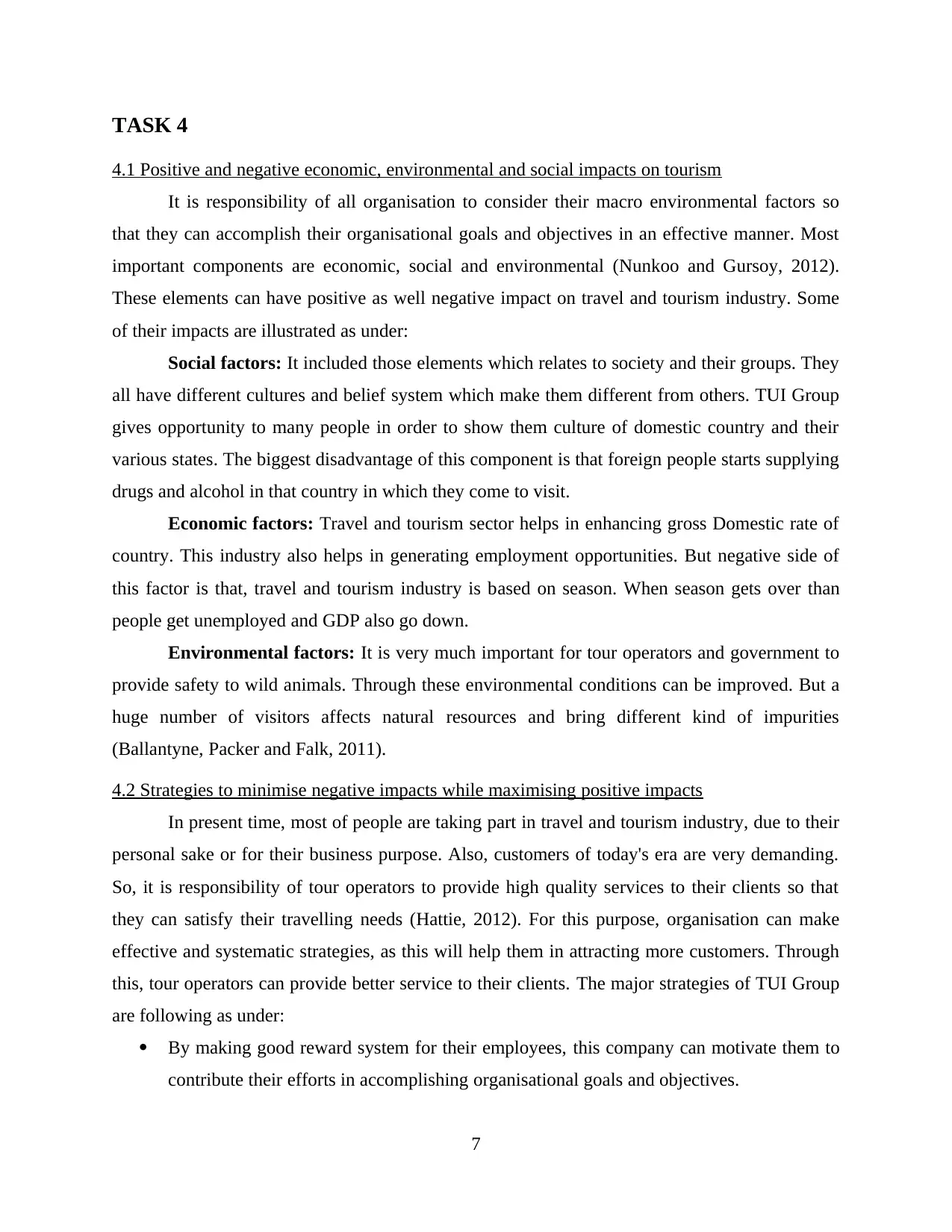
TASK 4
4.1 Positive and negative economic, environmental and social impacts on tourism
It is responsibility of all organisation to consider their macro environmental factors so
that they can accomplish their organisational goals and objectives in an effective manner. Most
important components are economic, social and environmental (Nunkoo and Gursoy, 2012).
These elements can have positive as well negative impact on travel and tourism industry. Some
of their impacts are illustrated as under:
Social factors: It included those elements which relates to society and their groups. They
all have different cultures and belief system which make them different from others. TUI Group
gives opportunity to many people in order to show them culture of domestic country and their
various states. The biggest disadvantage of this component is that foreign people starts supplying
drugs and alcohol in that country in which they come to visit.
Economic factors: Travel and tourism sector helps in enhancing gross Domestic rate of
country. This industry also helps in generating employment opportunities. But negative side of
this factor is that, travel and tourism industry is based on season. When season gets over than
people get unemployed and GDP also go down.
Environmental factors: It is very much important for tour operators and government to
provide safety to wild animals. Through these environmental conditions can be improved. But a
huge number of visitors affects natural resources and bring different kind of impurities
(Ballantyne, Packer and Falk, 2011).
4.2 Strategies to minimise negative impacts while maximising positive impacts
In present time, most of people are taking part in travel and tourism industry, due to their
personal sake or for their business purpose. Also, customers of today's era are very demanding.
So, it is responsibility of tour operators to provide high quality services to their clients so that
they can satisfy their travelling needs (Hattie, 2012). For this purpose, organisation can make
effective and systematic strategies, as this will help them in attracting more customers. Through
this, tour operators can provide better service to their clients. The major strategies of TUI Group
are following as under:
By making good reward system for their employees, this company can motivate them to
contribute their efforts in accomplishing organisational goals and objectives.
7
4.1 Positive and negative economic, environmental and social impacts on tourism
It is responsibility of all organisation to consider their macro environmental factors so
that they can accomplish their organisational goals and objectives in an effective manner. Most
important components are economic, social and environmental (Nunkoo and Gursoy, 2012).
These elements can have positive as well negative impact on travel and tourism industry. Some
of their impacts are illustrated as under:
Social factors: It included those elements which relates to society and their groups. They
all have different cultures and belief system which make them different from others. TUI Group
gives opportunity to many people in order to show them culture of domestic country and their
various states. The biggest disadvantage of this component is that foreign people starts supplying
drugs and alcohol in that country in which they come to visit.
Economic factors: Travel and tourism sector helps in enhancing gross Domestic rate of
country. This industry also helps in generating employment opportunities. But negative side of
this factor is that, travel and tourism industry is based on season. When season gets over than
people get unemployed and GDP also go down.
Environmental factors: It is very much important for tour operators and government to
provide safety to wild animals. Through these environmental conditions can be improved. But a
huge number of visitors affects natural resources and bring different kind of impurities
(Ballantyne, Packer and Falk, 2011).
4.2 Strategies to minimise negative impacts while maximising positive impacts
In present time, most of people are taking part in travel and tourism industry, due to their
personal sake or for their business purpose. Also, customers of today's era are very demanding.
So, it is responsibility of tour operators to provide high quality services to their clients so that
they can satisfy their travelling needs (Hattie, 2012). For this purpose, organisation can make
effective and systematic strategies, as this will help them in attracting more customers. Through
this, tour operators can provide better service to their clients. The major strategies of TUI Group
are following as under:
By making good reward system for their employees, this company can motivate them to
contribute their efforts in accomplishing organisational goals and objectives.
7
Paraphrase This Document
Need a fresh take? Get an instant paraphrase of this document with our AI Paraphraser
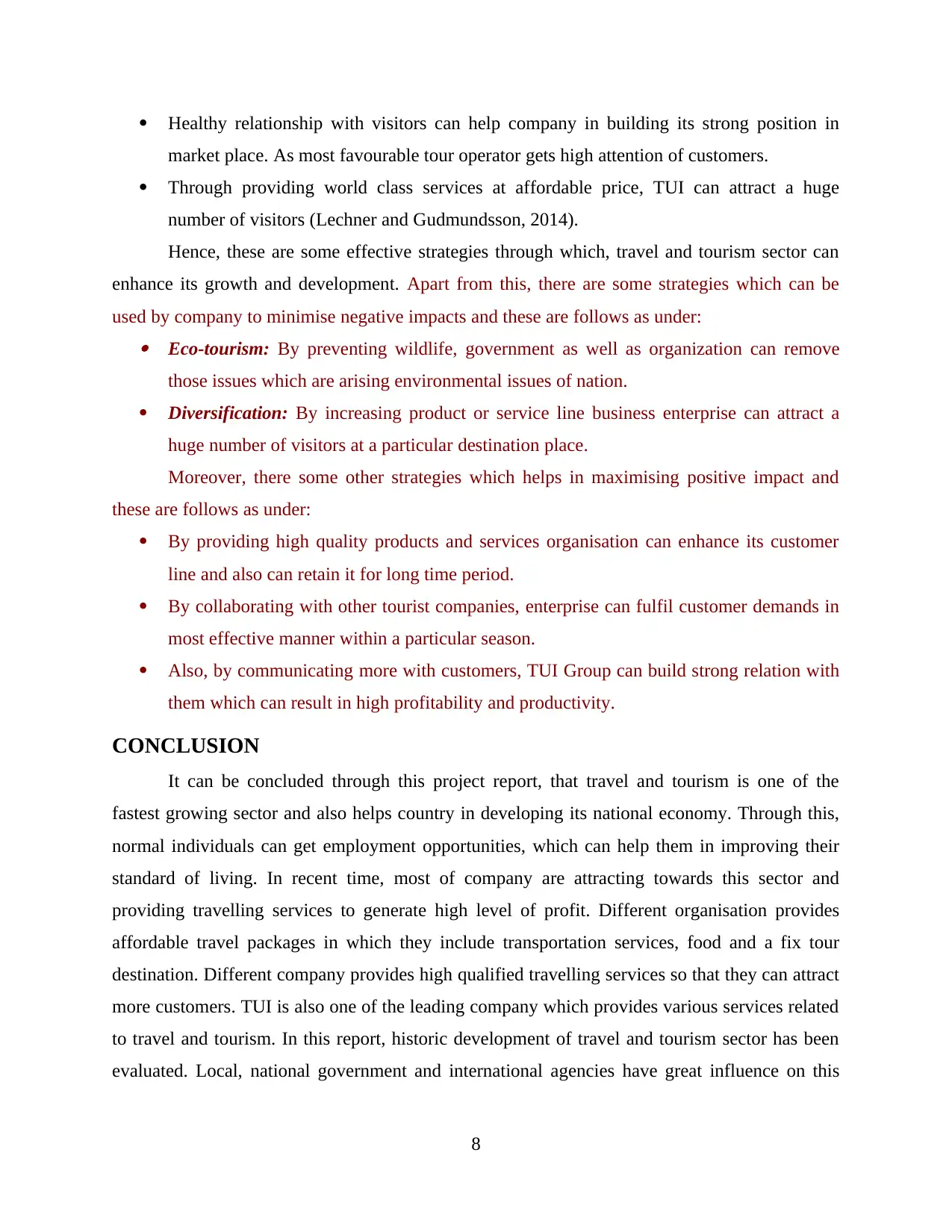
Healthy relationship with visitors can help company in building its strong position in
market place. As most favourable tour operator gets high attention of customers.
Through providing world class services at affordable price, TUI can attract a huge
number of visitors (Lechner and Gudmundsson, 2014).
Hence, these are some effective strategies through which, travel and tourism sector can
enhance its growth and development. Apart from this, there are some strategies which can be
used by company to minimise negative impacts and these are follows as under: Eco-tourism: By preventing wildlife, government as well as organization can remove
those issues which are arising environmental issues of nation.
Diversification: By increasing product or service line business enterprise can attract a
huge number of visitors at a particular destination place.
Moreover, there some other strategies which helps in maximising positive impact and
these are follows as under:
By providing high quality products and services organisation can enhance its customer
line and also can retain it for long time period.
By collaborating with other tourist companies, enterprise can fulfil customer demands in
most effective manner within a particular season.
Also, by communicating more with customers, TUI Group can build strong relation with
them which can result in high profitability and productivity.
CONCLUSION
It can be concluded through this project report, that travel and tourism is one of the
fastest growing sector and also helps country in developing its national economy. Through this,
normal individuals can get employment opportunities, which can help them in improving their
standard of living. In recent time, most of company are attracting towards this sector and
providing travelling services to generate high level of profit. Different organisation provides
affordable travel packages in which they include transportation services, food and a fix tour
destination. Different company provides high qualified travelling services so that they can attract
more customers. TUI is also one of the leading company which provides various services related
to travel and tourism. In this report, historic development of travel and tourism sector has been
evaluated. Local, national government and international agencies have great influence on this
8
market place. As most favourable tour operator gets high attention of customers.
Through providing world class services at affordable price, TUI can attract a huge
number of visitors (Lechner and Gudmundsson, 2014).
Hence, these are some effective strategies through which, travel and tourism sector can
enhance its growth and development. Apart from this, there are some strategies which can be
used by company to minimise negative impacts and these are follows as under: Eco-tourism: By preventing wildlife, government as well as organization can remove
those issues which are arising environmental issues of nation.
Diversification: By increasing product or service line business enterprise can attract a
huge number of visitors at a particular destination place.
Moreover, there some other strategies which helps in maximising positive impact and
these are follows as under:
By providing high quality products and services organisation can enhance its customer
line and also can retain it for long time period.
By collaborating with other tourist companies, enterprise can fulfil customer demands in
most effective manner within a particular season.
Also, by communicating more with customers, TUI Group can build strong relation with
them which can result in high profitability and productivity.
CONCLUSION
It can be concluded through this project report, that travel and tourism is one of the
fastest growing sector and also helps country in developing its national economy. Through this,
normal individuals can get employment opportunities, which can help them in improving their
standard of living. In recent time, most of company are attracting towards this sector and
providing travelling services to generate high level of profit. Different organisation provides
affordable travel packages in which they include transportation services, food and a fix tour
destination. Different company provides high qualified travelling services so that they can attract
more customers. TUI is also one of the leading company which provides various services related
to travel and tourism. In this report, historic development of travel and tourism sector has been
evaluated. Local, national government and international agencies have great influence on this
8
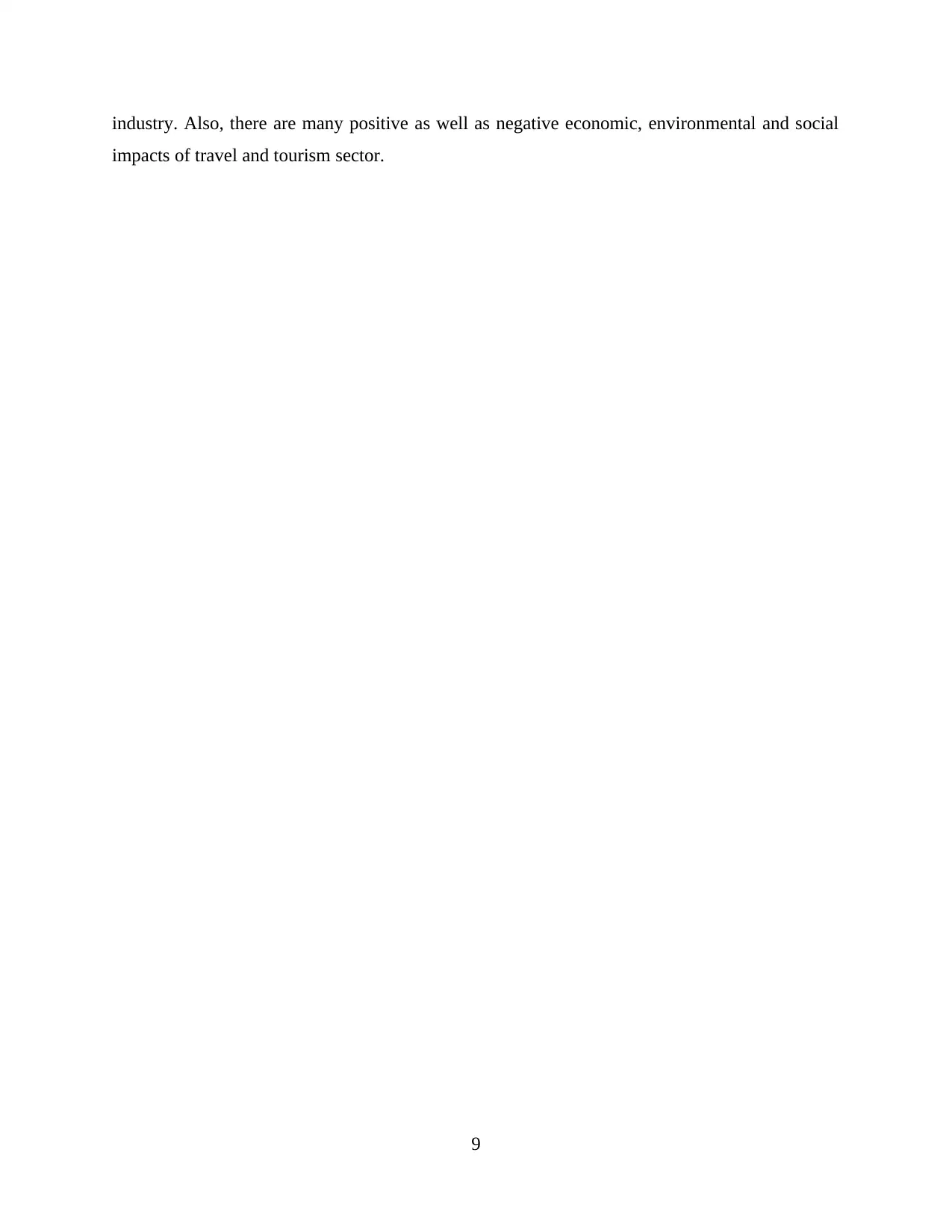
industry. Also, there are many positive as well as negative economic, environmental and social
impacts of travel and tourism sector.
9
impacts of travel and tourism sector.
9
⊘ This is a preview!⊘
Do you want full access?
Subscribe today to unlock all pages.

Trusted by 1+ million students worldwide
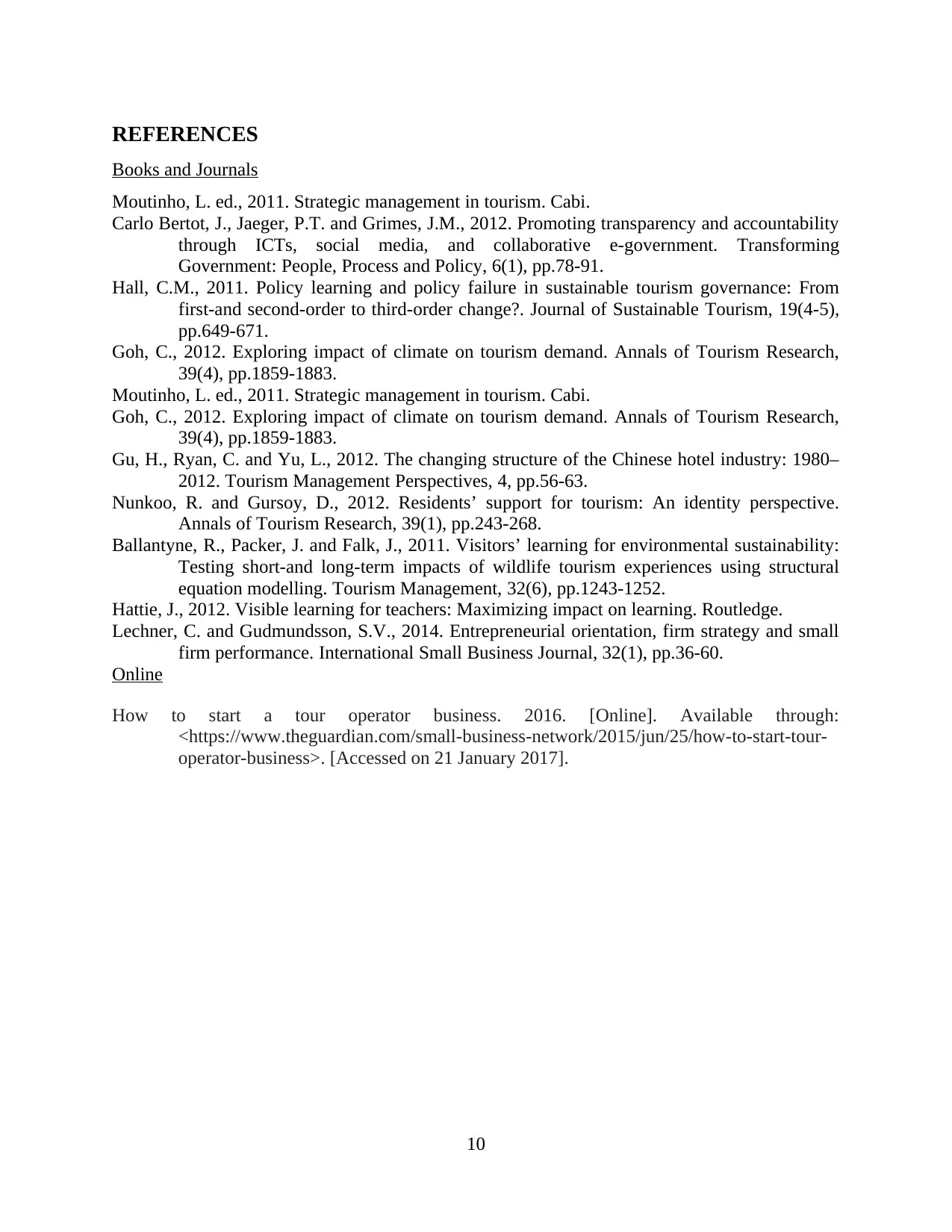
REFERENCES
Books and Journals
Moutinho, L. ed., 2011. Strategic management in tourism. Cabi.
Carlo Bertot, J., Jaeger, P.T. and Grimes, J.M., 2012. Promoting transparency and accountability
through ICTs, social media, and collaborative e-government. Transforming
Government: People, Process and Policy, 6(1), pp.78-91.
Hall, C.M., 2011. Policy learning and policy failure in sustainable tourism governance: From
first-and second-order to third-order change?. Journal of Sustainable Tourism, 19(4-5),
pp.649-671.
Goh, C., 2012. Exploring impact of climate on tourism demand. Annals of Tourism Research,
39(4), pp.1859-1883.
Moutinho, L. ed., 2011. Strategic management in tourism. Cabi.
Goh, C., 2012. Exploring impact of climate on tourism demand. Annals of Tourism Research,
39(4), pp.1859-1883.
Gu, H., Ryan, C. and Yu, L., 2012. The changing structure of the Chinese hotel industry: 1980–
2012. Tourism Management Perspectives, 4, pp.56-63.
Nunkoo, R. and Gursoy, D., 2012. Residents’ support for tourism: An identity perspective.
Annals of Tourism Research, 39(1), pp.243-268.
Ballantyne, R., Packer, J. and Falk, J., 2011. Visitors’ learning for environmental sustainability:
Testing short-and long-term impacts of wildlife tourism experiences using structural
equation modelling. Tourism Management, 32(6), pp.1243-1252.
Hattie, J., 2012. Visible learning for teachers: Maximizing impact on learning. Routledge.
Lechner, C. and Gudmundsson, S.V., 2014. Entrepreneurial orientation, firm strategy and small
firm performance. International Small Business Journal, 32(1), pp.36-60.
Online
How to start a tour operator business. 2016. [Online]. Available through:
<https://www.theguardian.com/small-business-network/2015/jun/25/how-to-start-tour-
operator-business>. [Accessed on 21 January 2017].
10
Books and Journals
Moutinho, L. ed., 2011. Strategic management in tourism. Cabi.
Carlo Bertot, J., Jaeger, P.T. and Grimes, J.M., 2012. Promoting transparency and accountability
through ICTs, social media, and collaborative e-government. Transforming
Government: People, Process and Policy, 6(1), pp.78-91.
Hall, C.M., 2011. Policy learning and policy failure in sustainable tourism governance: From
first-and second-order to third-order change?. Journal of Sustainable Tourism, 19(4-5),
pp.649-671.
Goh, C., 2012. Exploring impact of climate on tourism demand. Annals of Tourism Research,
39(4), pp.1859-1883.
Moutinho, L. ed., 2011. Strategic management in tourism. Cabi.
Goh, C., 2012. Exploring impact of climate on tourism demand. Annals of Tourism Research,
39(4), pp.1859-1883.
Gu, H., Ryan, C. and Yu, L., 2012. The changing structure of the Chinese hotel industry: 1980–
2012. Tourism Management Perspectives, 4, pp.56-63.
Nunkoo, R. and Gursoy, D., 2012. Residents’ support for tourism: An identity perspective.
Annals of Tourism Research, 39(1), pp.243-268.
Ballantyne, R., Packer, J. and Falk, J., 2011. Visitors’ learning for environmental sustainability:
Testing short-and long-term impacts of wildlife tourism experiences using structural
equation modelling. Tourism Management, 32(6), pp.1243-1252.
Hattie, J., 2012. Visible learning for teachers: Maximizing impact on learning. Routledge.
Lechner, C. and Gudmundsson, S.V., 2014. Entrepreneurial orientation, firm strategy and small
firm performance. International Small Business Journal, 32(1), pp.36-60.
Online
How to start a tour operator business. 2016. [Online]. Available through:
<https://www.theguardian.com/small-business-network/2015/jun/25/how-to-start-tour-
operator-business>. [Accessed on 21 January 2017].
10
Paraphrase This Document
Need a fresh take? Get an instant paraphrase of this document with our AI Paraphraser

1
1 out of 11
Related Documents
Your All-in-One AI-Powered Toolkit for Academic Success.
+13062052269
info@desklib.com
Available 24*7 on WhatsApp / Email
![[object Object]](/_next/static/media/star-bottom.7253800d.svg)
Unlock your academic potential
Copyright © 2020–2026 A2Z Services. All Rights Reserved. Developed and managed by ZUCOL.




